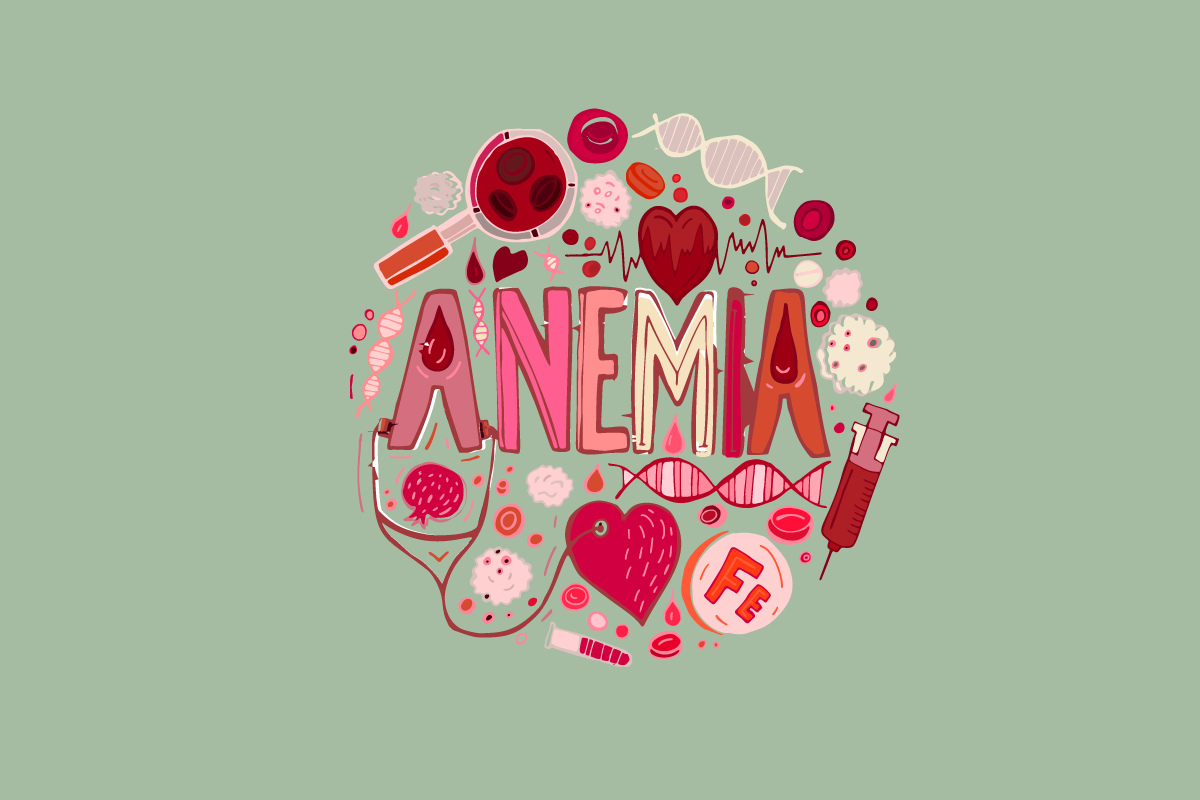“You might be anemic.”
If you’ve ever mentioned that you always feel tired or weak to a provider — or even to a friend — someone may have suggested that you could be anemic. It’s a condition that affects up to 30% of people, yet few of us know exactly what anemia is.
WellTuned spoke with Dr. John Calvin Channell, a medical director for BlueCross BlueShield of Tennessee, to learn more.
What is anemia?
Dr. Channell: Anemia happens when your body doesn’t have enough red blood cells. That causes problems because red blood cells are what supply oxygen to all the tissues and organs throughout your body.
What causes anemia?
Dr. Channell: The most common cause of anemia is low blood iron. Our bodies use iron to form hemoglobin, the molecule that carries oxygen. Low blood iron can be caused by several different factors, but the most common are blood loss or not eating enough iron-rich foods.
What are the symptoms of anemia?
Dr. Channell: This is where things get tricky. Because anemia is connected to a drop in red blood cells, your symptoms are entirely dependent on how quickly that drop occurs.
- If anemia comes on quickly (acute), your symptoms are likely severe enough that you’ll have to seek treatment.
- If, however, anemia comes on slowly over a long period of time (chronic), the most common symptom may be no symptoms at all.
Common symptoms of acute anemia
The low red blood count associated with anemia can cause:
- Constant fatigue (a sense of always feeling tired)
- Headaches
- Shortness of breath
- Inability to walk as far as you used to
- Decreased cognitive ability
- Heart attack (due to insufficient oxygen being carried throughout the body)
With chronic anemia, people come in with very low red blood counts and say they’re perfectly fine. While symptoms aren’t as obvious, they do exist.
Common symptoms of chronic anemia
- Decreased hair growth
- Dry skin and hair
- Memory impairment
- Depression
- Fainting
- Decreased ability to concentrate
- Pica
You’ve probably heard of pica, a condition where people have abnormal cravings to eat things that have no nutritional value. Extreme examples include clay or dirt, but most commonly, people have an urge to eat ice. If you notice someone always standing at the fridge eating ice, that may be caused by anemia.
What causes anemia?
Dr. Channell: Acute anemia happens when blood loss occurs over a short period of time. Most often, that bleeding is related to:
- Menstruation
- Childbirth
- Surgery
- Gastrointestinal conditions
- Bleeding ulcers
- Varicosity (dilated blood vessels in the esophagus, usually from alcohol abuse)
- Lower intestinal bleeding
- Polyps
- Cancer
- Diseases of the bowel such as Crohn’s disease
With chronic anemia, blood loss occurs slowly and symptoms may be normalized by social cues. For example, females think, ‘My periods are heavy, but that’s normal,’ when in reality, they’ve had abnormally heavy periods for a long time without knowing it.
How common is anemia?
Dr. Channell: Very common. While only 12% of males will experience anemia, it’s far more common for females. Over a lifetime, 30-50% of females will have abnormal heavy bleeding at least once, but only 6% will seek physician care for it.
More than 1 in 4 females (27%) have abnormally heavy menstrual bleeding, which means:
- Bleeding through clothes or onto bedding
- Changing protection every 2 hours (or more often)
- Wearing double protection (a tampon and a pad)
- Passing large clots
Unfortunately, less than half of women who experience heavy menstrual bleeding will consult a provider about it.
How is anemia treated?
Dr. Channell: With iron deficiency anemia, the primary treatment is oral iron supplements, which can help boost the levels of iron in the blood. However, some people have side effects such as nausea, vomiting, constipation or black, tarry stool.
In those cases, or in more advanced cases, providers may suggest iron infusions done through an IV. Early versions of IV treatment often triggered allergic reactions, but there have been big advances recently, so now it’s safer and more effective. In fact, with oral supplements, you might see a bump in hemoglobin of 1-3% every month. With IV infusions, you could see a 10-12% increase — in one week.
Another good supplement to any anemia treatment is adding more iron-rich foods to your diet. Red meat, shellfish, legumes and leafy green vegetables all have significant amounts of iron.
Is anemia connected to other health conditions?
Dr. Channell: Some anemia has genetic causes. In sickle cell anemia, the gene has a mutation so it can’t carry oxygen as well, and 10% of African-Americans have the sickle cell trait. There’s also thalassemia, a rare inherited blood disorder that’s more common in people from Mediterranean countries, Asia, Africa and the Middle East.
What else should people know about anemia?
Dr. Channell: I would encourage all females of reproductive age — any who are still having periods — to talk with their doctor about their periods and ask if they need to get screened for anemia.
You may be losing enough blood over the course of time that it’s affecting you in ways you don’t notice, especially if you don’t eat a lot of iron. If you don’t know you’re having a problem, you don’t know you’re having a problem! Talking openly and asking questions is always the best way to go.
Related from WellTuned
- What you need to know about sickle cell anemia
- Guide to folic acid (and how it can help prevent anemia)
Get more information about specific health terms, topics and conditions to better manage your health on bcbst.com. BlueCross BlueShield of Tennessee members can access wellness-related discounts on fitness products, gym memberships, healthy eating and more through Blue365®. BCBST members can also find tools and resources to help improve health and well-being by logging into BlueAccess and going to the Managing Your Health tab.





